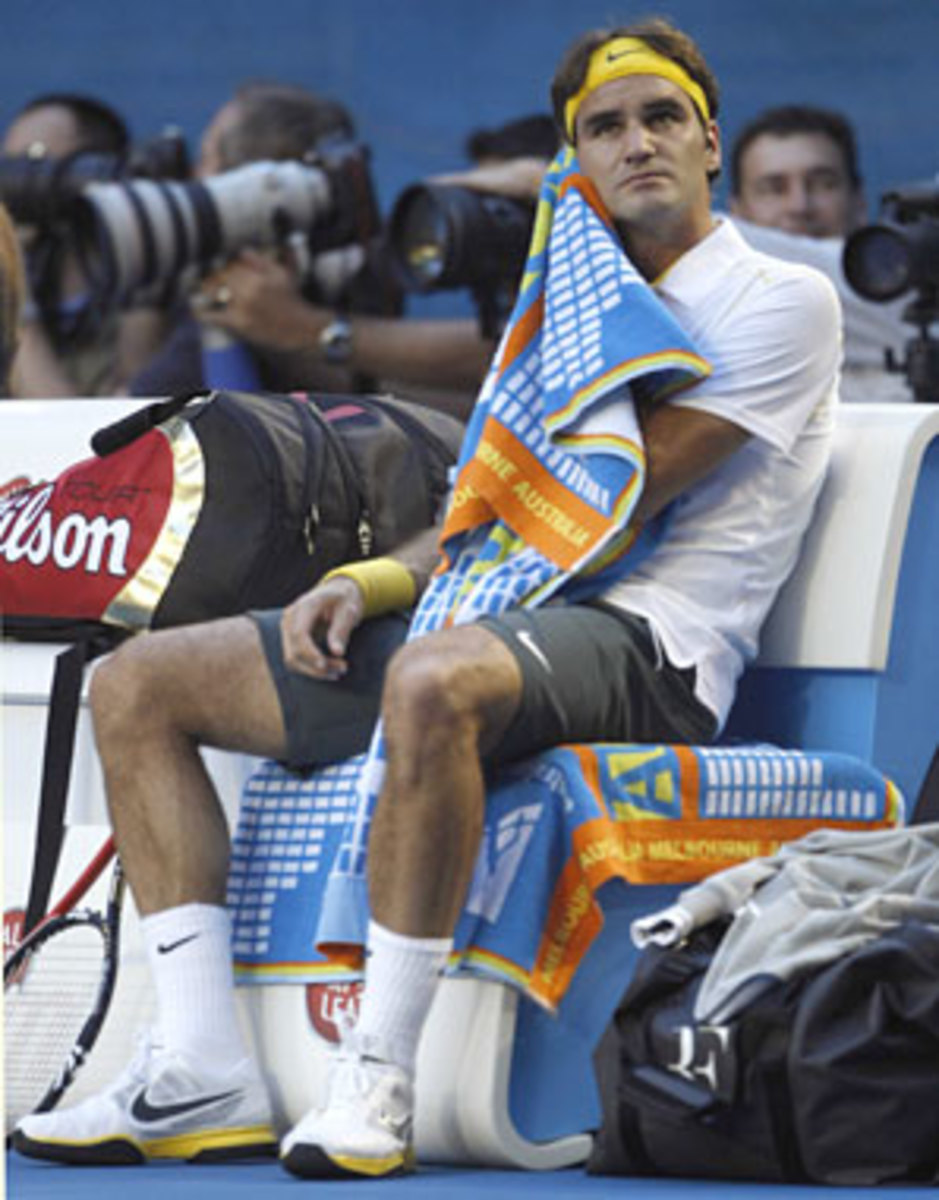Federer far from finished, but other top players clearly catching up
Roger Federer had a champion's response at the Australian Open when journalists asked him if a torch was being passed, saying, "Let's talk again in six months." Federer surely can't wait to prove a few points in March, when the prestigious Masters 1000 events will be contested on the hardcourts of Miami and Indian Wells.
I've never been one to write off Federer, or attempt to be the first to claim he's slipping. That's a pointless, insulting exercise. There's no question, however, that we need to watch how Federer handles the big points. Over the past few months, the evidence hasn't been much to his liking.
The plain fact is that opposing players, at least those in the upper echelon, are beginning to like their chances against Federer in the most crucial situations. Not even Rafael Nadal can match the great man's virtuosity, but he has shown a distinct vulnerability in the clutch.
Federer held match points at the 2010 Indian Wells and Miami but lost both matches, to Marcos Baghdatis and Tomas Berdych, respectively, in third-set tiebreakers. In Rome, he took an inexcusable first-round loss to Ernests Gulbis, who was clearly choking as he blew six match points of his own along the way.
At Madrid, where he reached a much-anticipated final against Nadal, Federer actually swung and missed on the final point. He blew five match points in a semifinal loss to Gael Monfils at the Paris Masters. Along with his disappointing Grand Slam losses at the French Open and Wimbledon, he held a match point against Novak Djokovic in the U.S. Open semifinals but couldn't finish the job.
It's not as if coaches and insiders are muttering "he's lost it mentally" in private conversations. Federer still carves out victories that inspire the most lavish praise. But a theory that gained momentum last summer -- the rest of the world is catching up -- now seems entirely valid.
Wrapping up the Australian Open on other fronts:
• Before the men's final, Andy Murray pondered the notion of playing his longtime friend and rival, Novak Djokovic, and declared, "It's going to be brutal." More than he knew.
• During Li Na's historic run on the women's side, it was common to hear she had "1.6 billion Chinese rooting for her." Really? All 1.6 billion? Couldn't there be a Kirilenko or Ivanovic fan in there? Someone entranced by Francesca Schiavone's game? A big fan of Andrea Petkovic's nutty dance?
• Speaking of which: It's nice to see the German player let loose a little -- after doing the dance in a spontaneous moment at last year's U.S. Open, Petkovic superstitiously hauls it out after each win -- but that is one soul-free strut. If that's part of the entertainment package, then here comes Ray Conniff and his orchestra playing "Cold Sweat."
• It will be difficult to fully embrace the Chinese tennis revolution, if it takes place, until their men make some type of impact. The sport has been roundly rejected by the men (taking a back seat to table tennis), and at the moment, No. 317 Zhang Ze is their top-ranked player. Li had a typically pointed remark on the subject when she said China's male players are "strong in the body, but not so strong in the mind."
• Patrick Rafter, the new captain of Australia's Davis Cup team, has taken on quite a project: getting crusty Lleyton Hewitt and 18-year-old Bernard Tomic to join forces. The two have had an adversarial relationship since 2009, when Hewitt asked Tomic to practice with him at Wimbledon and Tomic declined. "I really think we can resolve this and have those two guys do some real damage in Davis Cup," Rafter said last week. He'll need to get past Tomic's overbearing father, but Rafter likes the idea of Tomic being around Hewitt and taking some lessons in net play from one of the all-time masters, Tony Roche.
• Just when we were celebrating the apparent decline of Michelle Larcher de Brito (she lost in the Plantation Futures to someone named Julia Boserup), along comes a new horrific shrieker in Sandra Zahlavova, who lost to Venus Williams in the second round. Watching that match on television, Murray went on Twitter to write, "Turned it on and thought someone was giving birth."
• Rhythm is the key to any good service motion, and it comes in many forms. John McEnroe unleashed his serve in deliberate, methodical stages. Martina Navratilova displayed a style of pure athleticism (alarmingly absent on today's women's tour). Djokovic once felt compelled to bounce the ball, endlessly, including preposterous 32 times on a point against Federer at last year's Australian Open. Then came Alexandr Dolgopolov, the Ukranian sensation, at Melbourne this year. This guy goes through his service games like a player in hurry-up practice mode. More often than not as the tournament unfolded, he needed only five seconds between a "fault" call and the next delivery. Very refreshing (and good call by Darren Cahill, comparing the quick-time motion to Roscoe Tanner's).
• You have to love the westernization of names, and how someone named Jiang Shan, Li's husband, becomes "Dennis" in America. Reminds me of my grade-school days, when they couldn't find the equivalent of Bruce in a Spanish tutorial and decided I would be "Carlos." This could come in handy with Dolgopolov, who says he isn't at all averse to a simpler version. Let me be the first to suggest "Tommy McGee."
• Schiavone, after charming so many fans with her panache and post-match demeanor, was asked if she could reach No. 1 at the age of 30. "Step by step," she said. "I never fly, so one step. I have 10 years more."
We should be so lucky.






